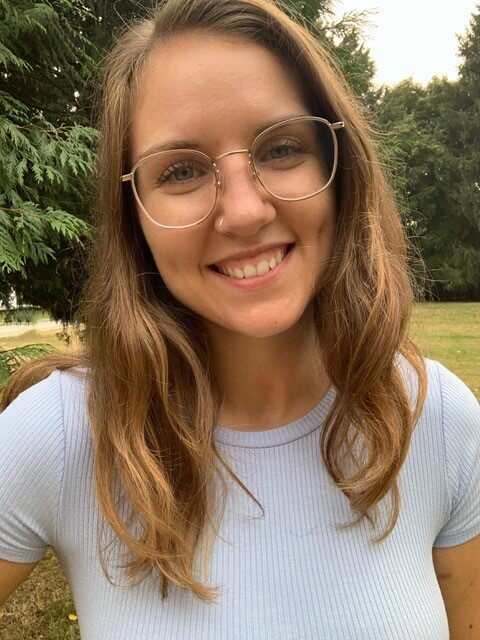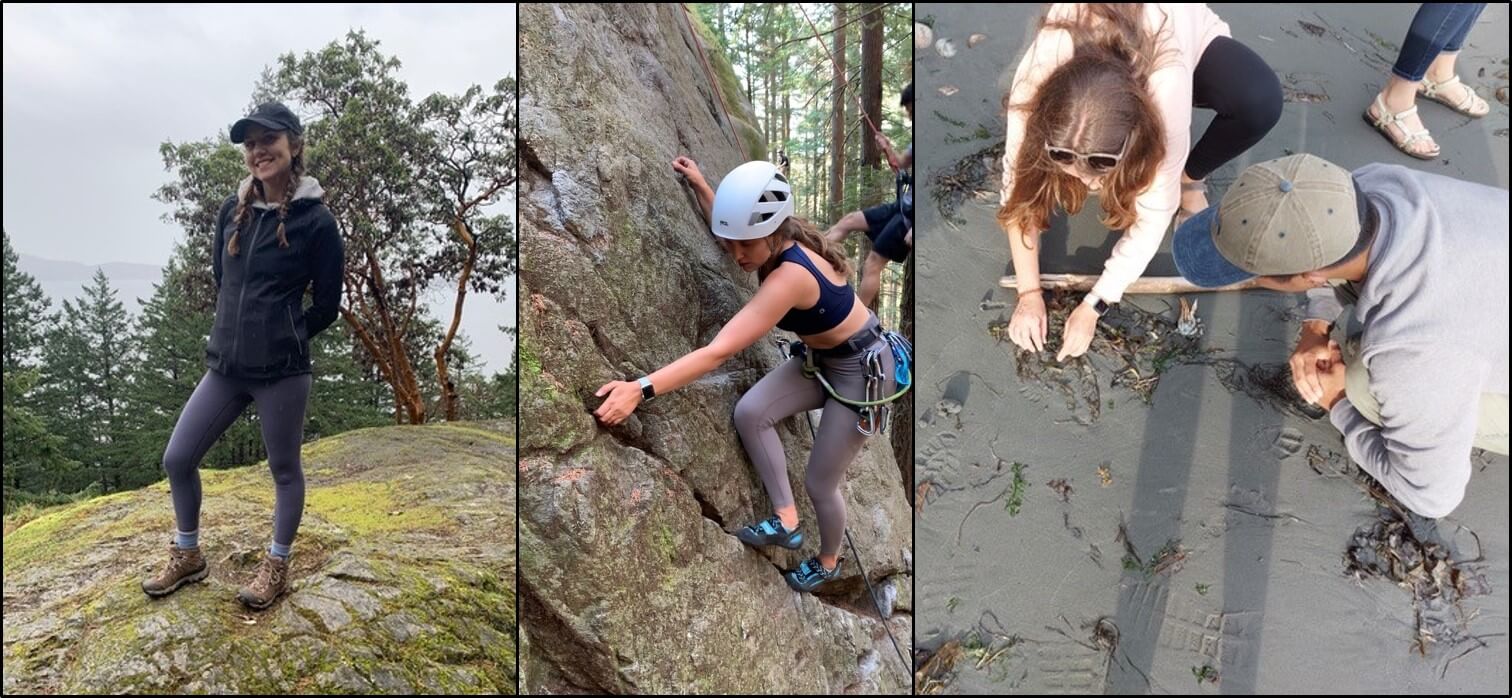
My name is Jessica and I grew up in Regina, Saskatchewan. I did my undergrad at Western University in London, Ontario, and I actually have two undergrad degrees – a BSc in Food nutrition and a BSc in Environmental Science. I started off in the nutrition realm, found that it wasn’t for me, and then I switched over to environmental science and ended up getting two degrees out of the experience. I’m currently a Master’s student in the UBC Zoology department, but am planning to switch into the PhD program this fall.
I’m in the Germain lab, where we study biodiversity and coexistence. I’m specifically interested in investigating community assembly. I like to think about why we see all the different types of species of plants or animals co-existing in one spot. How did they get there? What types of interactions occur that allow them to all exist together in one space? And how do changes in the environment, movement patterns, and species interactions influence the patterns that we see? I have been an environmentalist at heart since I was very young, and I’ve always enjoyed learning about nature and how natural systems come to be.
I’ve been a TA for BIOL 230 (Fundamentals of Ecology) three times now, once as a lecture TA and twice as a lab TA. I was recently awarded the 2022 Biology TA Teaching Award.
What do you most enjoy about being a TA?
I really like connecting with people and helping them work through the hard stuff. One of my favorite things is when a student comes to me and says, ‘hey, I don’t really understand this, can we talk about it?’ I love working through things with them step-by-step and helping them realize things on their own instead of giving them the answers. I know that as a learner myself I really appreciate when someone guides me through understanding the material (or gives me the tools to do so), so I really try and incorporate that into my teaching practice as much as I can. I like to encourage students to tackle tough problems or struggle with challenging concepts independently, but also make sure that I am available to provide guidance when they need it. I love helping students increase their confidence in their ability to learn. I find that really rewarding.
What has being a TA brought to your graduate studies experience?
I’m really grateful to have been able to be a TA for my supervisor, Rachel Germain. She’s an amazing mentor, especially when it comes to teaching. Her lectures are very relatable and she really gets students to be engaged. Watching her teach has changed a lot of the ways that I think about education. I feel really lucky to have her not only as a role model, but also someone that I can go to to talk about teaching-related things. Being a TA in Rachel’s course has also allowed me to build trust and camaraderie with her and has helped me to feel closer to her as a person. When you’re teaching undergrad courses, challenges come up that you have to deal with together as a teaching team, so you get to learn a lot about each other and from each other, which has helped to improved our working relationship.
What has been an interesting outcome of your TA experience?
I really enjoy talking to students not just about class content, but also about other aspects of school and science. I recently had a student ask me what it was like to be more involved in research as an undergrad and how to go about doing that. We talked for maybe half an hour during office hours and then they emailed me back and forth a little bit to keep me updated with what they were doing and to ask questions. I really loved helping this person in this way, and they ended up getting a field position for this summer. I’m so excited for them!
How has your unique background influenced your TA experience?
During my undergrad in nutrition, I was involved in a peer education program that taught university students how to cook healthy meals, and we used a lot of hands-on activities to do that. We’d have cooking demonstrations and would use games and trivia-style questions to get people involved. That experience has really informed my methods for engaging students in the classroom. I now use a lot of questions, activities, and real-world examples when I teach to make it more fun and interesting for students. I also try to get students to model things to each other in lab because I think that experiential learning is one of the best ways to learn. I try to incorporate active learning where I can, and this has come from this background of watching university students get really excited about cooking pasta or making an omelet and realizing that they can learn while also having fun!
What opportunities relating to teaching and learning have you been a part of?
I really enjoy talking with young people about ecology. One way that I do this is by participating in LEEF (Learning Ecology and Evolution Fundamentals). In this program you get paired up with a high school or elementary school teacher and they give you an idea of a lesson that they want you to teach their class. You then develop a lesson plan and discuss it with the teacher before delivering it. I recently did my first in-person lesson in a grade 4/5 classroom where I used a species guessing game to teach students about biodiversity in BC. My favourite part of delivering these lessons is always interacting and engaging with the students; I love hearing about their own stories/experiences with the material that we are discussing and seeing their facial expressions when they learn something new.
What do you like about TAing BIOL 230?
One of my favorite projects in BIOL 230 is where students get to tell us about something ecological that they’re seeing in their own life. They can go for a walk in the forest, or run an experiment, or research their favourite organisms, and then tell us about it using a medium of their choosing. For example, they can make a podcast, brochure, poster, video, etc. – basically anything they want! Students always blow me away with how creative they are when it comes to this project. It feels really great as a TA to be able to mentor students through the process and to get them thinking about where they see ecology in their lives, because it is literally everywhere! Helping students realize that is really fun.
What is a memorable anecdote from your own undergraduate experience?
I was almost finished with a BSc in nutrition when I took a course in human ecology. One day the professor in this course showed us a video of Yellowstone National Park and how the reintroduction of wolves changed the ecology of the park. While I was sitting there watching this video, I was thinking, ‘why the heck am I in nutrition? This is what I’m interested in! This is what I want to do!’ I’d been feeling disinterested, unmotivated and not very engaged in my nutrition program, and watching this video really sparked my interest and got me excited. So I immediately started looking into how I could switch into environmental science. It’s funny because I’ve always had this interest in ecology, I just got lost along the way, but then this thing happened that brought me back.
What do you like to do in your spare time?
I really like to be outside. I love hiking and rock climbing, and I recently got into snowboarding. I also enjoy making my own clothing. I find that it’s a fun way to be more sustainable and conscious about your wardrobe, and I like that I get to be self-sufficient and creative at the same time. I knit, flip clothes that I thrift, and most recently, I’ve started sewing from scratch as well. I’m also a huge foodie and I especially love plant-based foods.

What are your plans following graduation?
I have no idea. I bounce back and forth all the time, but I’ve always thought about being a professor, where I would have the independence to pursue research that I find interesting and also teach. I love teaching young people – I think it’s so amazing and rewarding – and I would love to have that incorporated somehow into my career. I’ve also thought about potentially working with a non-profit, such as an organization that engages in conservation or restoration.
What advice do you have for undergraduate students?
There’s a lot of pressure as a young person to know what you want to do right when you finish high school and to have your life figured out. I really hope that students understand that they don’t have to know where they’re going with their life, and that it’s okay to change their mind; we’re all on our own timeline. I know I struggled with this bit myself when I realized that I wanted to switch my degree and that it was going to take me longer to finish, but making the change was worth it for so many reasons. Now every time I interact with a student who is questioning where they are, I really try to encourage them to follow what their passion is and not worry about what other people say. It doesn’t matter if you’re in school for six years instead of four; if you’re happier in the end, then that’s all that matters.